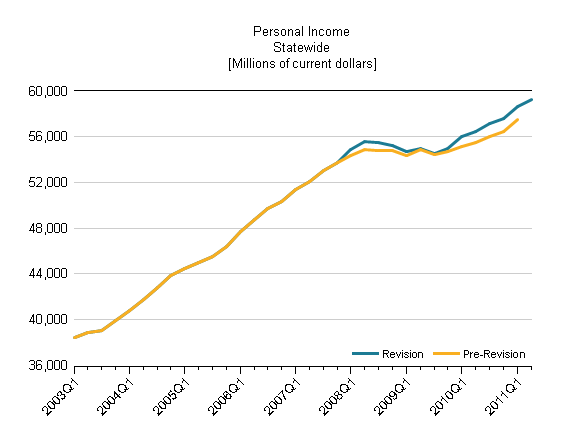Personal income estimates for the state of Hawaii were revised up by the Bureau of Economic Analysis (BEA) in their recent release State Personal Income: Second Quarter 2011. This update revises personal income data released after 2008 and reports new data for the second quarter of 2011. On the national level personal income was revised up by 0.6% for 2008 and down for both 2009 and 2010 by 2.1% and 1.4% respectively. Personal income for the state of Hawaii was revised up for all three years–1.1%, 0.4%, and 1.8% for 2008, 2009, and 2010 respectively.

Despite the upward revision, the latest data shows that personal income in the state grew more slowly than for the nation as a whole. In the second quarter of 2011, personal income at the national level grew at a seasonally adjusted quarterly rate of 1.1%. Statewide personal income grew by only 0.9% during the same period–ranking Hawaii 45th among the states. Additionally, personal income both locally and nationally saw a clear deceleration in the second quarter of 2011 compared to the first. In the second quarter of 2011, national personal income grew at only 1.1% compared to 2.1% in the first quarter; locally personal income grew by 0.9% compared to 1.8% in the first quarter. A significant portion of this deceleration is the result of the one time jump in income growth in the first quarter of 2011 due to the cut in the personal contribution rate for social security. This tax reduction was part of the Tax Relief, Unemployment Insurance Reauthorization and Job Creation Act of 2010.
Personal income is defined as “the income received by all persons from all sources.” Effectively personal income is a measure of all income received: property income (rental income, dividends, and interest), net earnings (wages, salaries, and benefits after deductions for government social insurance programs), and current transfer receipts. Statewide property income contributed 0.4 percentage points, net earnings contributed 0.3 percentage points, and current transfer receipts contributed 0.2 percentage points of personal income growth in the second quarter of 2011.
In the second quarter of 2011 statewide total earnings increased by $214. The majority of the earnings growth was concentrated in four sectors: Health Care and Social Assistance, Administrative and Waste Services, Retail Trade, and Construction. Health Care and Social Assistance proved to be the largest contributor with earnings growth of $83 million. The other three sectors each saw earnings growth of slightly more than $50 million. Some of these gains were offset by a $40 million reduction in earnings in the Accommodation and Food Services sector, as well as a $31 million drop in the Transport and Warehousing sector.
An important note is that these personal income statistics are reported in nominal dollars; adjustments have not been made for price changes. While statewide personal income increased in nominal terms in the second quarter of 2011, the local price level, measured by the consumer price index, actually increased at a faster rate. As a result, the real value of all income received by all persons in the state of Hawaii actually fell by 0.3% in the second quarter of 2011.
– Jimmy Jones





